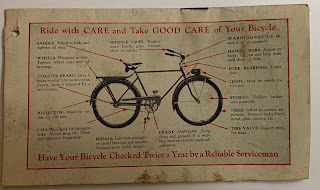 |
| It's been a while since we've had such a "White Christmas." |
Monday, December 28, 2020
Hindsight is 2020
Thursday, December 17, 2020
Bike Safety 101: "This Is Johnny's Car"
Covid is surging. There is a vaccine currently making its way to the highest-risk folks - but the rest of us still have a long wait. Schools are "online" again as our region has reached the "purple zone" on the state's risk-level color chart. I'm working from home, alongside the RetroKids and my RetroWife. We're all on computers in separate rooms fighting for internet bandwidth and distraction-free zones for our various Zoom meetings. 2020 is drawing to a close.
Damn, that sounds almost post-apocalyptic, doesn't it?
So I'm digging around through some old boxes in my basement, looking for what, I don't even remember, when I came across this:
"Johnny Doesn't . . . "
"Johnny Does . . . "
 |
| The tailfins on that car give a clue as to the age of this thing. |
"Safe Bike Riders Like Johnny Make Skillful Drivers"
Now there's something I can definitely get behind. I'm convinced that people who routinely ride with traffic are generally more observant and better able to predict the behavior of other road users. I sometimes describe it as "Spidey Sense" - and it comes from knowing how badly most drivers drive, and how clueless (or even aggressive) they can be when it comes to cyclists. I also recognize how much that carries over when I'm in my car.
The pamphlet also explains that according to state law (Pennsylvania, in this case) a bike and a car are the same - and subject to the same rules. Good to know as a cyclist - but it's something that probably bears repeating to drivers more. Equal in the eyes of the law - but the real problem to us as riders is getting drivers to recognize our rights - or even to respect us at all. Especially when their attention is compromised by that addictive attention-sucking cell phone. But then again - such things were the stuff of science fiction when this pamphlet was published.
In that same box, I found a few other old pamphlets with similar, and sometimes dated, safety advice.
The Bike Riders Rules for Safety from Employers Mutuals (sounds like an insurance company to me) suggests that kids only ride on streets where traffic is light, dismount and walk at intersections, always pull over to allow cars to pass, and (oddly, if you ask me) always park your bike on the sidewalk.
The ABC of Safe Bicycle Riding from the Bicycle Safety League looks to me like something that would have been hanging from the handlebars on a new bike in the early '50s.







